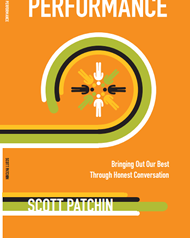Every time I share the JoHari Window with a group of leaders I am amazed at the impact it has on their view of the conversations they have with their team. The Johari Window is a simple and powerful tool for leaders to see the impact they can have on the everyday conversations with their people that are the foundation of strong and trusting relationships. Here are some tips for using this tool to become a more people-centered leader.
communication
Owning Your Performance: Gremlin Training 101
Rick Carson calls them Gremlins. Seth Godin calls it our Lizard Brain. A key part of performance is learning to get unstuck when we are faced with a big challenge. Leaders need to be great at this, and helping your team become great at this will do amazing things for individual and organizational performance. Here are some learning resources that will help you develop mastery as a leader and equip others to join you on the journey.
How to win the Talent War – part 2
Nature abhors a vacuum. In the war for talent, your leadership weapon is to create positive vacuums and provide support for those willing to fill them in a positive way. It is not always easy work, but it will be the work that makes you stand out as a leader. Talent management, when done well, is about building a team of vacuum fillers and being skilled at creating the right vacuums. Read on . . .
Powerful Question For Leaders – What is within your control?
What is within your control? A powerful question that digs through the complexity of a situation and helps us see our role in the solution. It is that simple, and not that easy. How do you, as a leader, respond to truth statements that come out of frustration, conflict, or just plain being busy? Here are three actions to consider the next time you go mining for what your team really believes. A big part of leadership is about great conversations – here are some tips to having some.
Empathy: 3 Things Leaders Can Do to Develop It
Leaders have to be empathetic, and unfortunately there is not a metric on empathy which makes it elusive and often ignored. That is until the feedback comes by key people leaving or they do not care about me/us. Empathy can be developed, and here are three things any leader can do to develop it. Great conversations start with a question, and empathy requires some great conversations.
Good Question – Great Question
What if we asked more questions? You might be thinking that you do ask more questions, at least compared to the people around you. Here is some research on kids that I believe applies to adults. Do you really think the graph starts going back up AFTER the age of 18? It comes down to being aware of how our EGO gets in the way and committing to asking GREAT questions vs GOOD questions.
3 Questions that help create a culture that SUPPORTS performance
Is a performance conversation you are having with your own leader, peer, or direct report laced with adjectives and/or emotions? Too often they are, and it clouds the real issues that need to be talked about. Here are some tips for creating a culture that supports performance – whether you are a leader or someone being led.
Relationships or Performance?
When relationships matter, process trumps outcome. Leadership does not have to be about relationships or performance, and yet there are circumstances where performance do trump relationships. Great conversations start with a question. Here are some questions to help you think about how you are aligned as a leader.
The Smartest Person In The Room
Captain John Meier understands that great conversations start with a question. He also knows that to serve first as a leader one must seek answers and input first. Of course, he commands an aircraft carrier, so he has some experience leading. Here are two tips he shared to move an intent to serve to an ACTION that your team will see and feel.
When we don’t react, and Listen
Great conversations start with a question. Leadership development is about learning to listen and then react, and to act out of an understanding of most of the variables in the situation so that the decision is the best one for your people and the organization. That is what I believe, and this is a piece of how to DO that has a leader. This is also a foundation for talent management.
Ignorant vs Stupid vs Agile
We try to avoid labeling people, and yet words have definitions that help us clearly state something we are seeing. In the world of talent management, there is a fine line between being ignorant and stupid. Effectively managing talent means knowing their attitudes towards learning and how agile their are. Talent management is about great conversations, and here are some tips for leaders to have them with themselves and their people.
Relationships: Building vs Maintaining
Relationships are tricky. They start at random places – soccer games, first days of a new job, school functions, board meetings. They only actually become a relationship, a thing that we can point to or hold up as something that has been created if we continue to deal with each other or are connected in some way. Leaders need to be good at this. Talent management requires this. Great conversations happen when we are focused on this.
